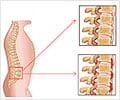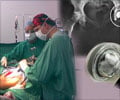Research suggests that genes responsible for generating matrix metalloproteinase 1 and vitamin D synthesis may determine the success of long-term hip replacement surgery.
The researchers analysed genetic variations in 312 people, just over half of whom (162) had problems after hip replacement in the 10 years following surgery.Among those with symptoms, 91 had early signs of 'aseptic loosening,' which describes a condition in which the artificial joint comes loose and the surrounding bone begins to dissolve. The other 71 patients had deep-seated infection, which occurs when the body is unable to control infection caused by bacteria colonising the artificial implants.
DNA samples were taken from all participants to test for genetic variations in genes responsible for generating matrix metalloproteinase 1, or MMP1 for short, interleukin 6, and vitamin D synthesis.MMP1 is an enzyme that breaks down collagen, the main protein found in bone and cartilage, while interleukin 6 is a chemical involved in bone metabolism and the immune response. Vitamin D synthesis is important for strong healthy bones.
Variations in the interleukin 6 gene did not seem to have any effect. But those with variations in MMP1 were more than three times as likely to have aseptic loosening as those who did not carry the genetic variation. And variations in the vitamin D receptor gene almost doubled the chances of bone dissolution and deep infection.
The authors conclude that if confirmed in other research, these findings could be used to predict long term success in patients undergoing hip replacement surgery. And they could also be used to develop targeted genetic treatments.
Source-Eurekalert
PRI/S










